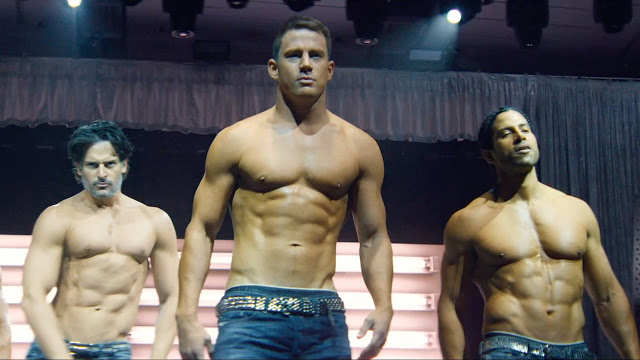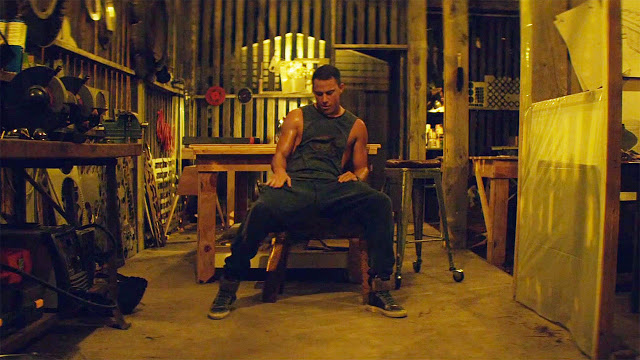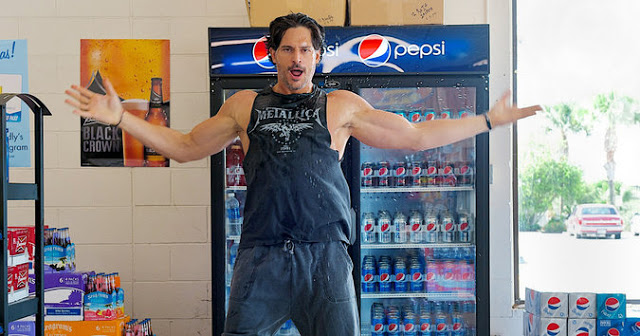A few months ago, I saw a movie about an inveterate warrior who gets pulled back into a turbulent conflict, and who uses his ingenuity and physical prowess to triumph in battle. A few days ago, I saw another movie with a similar storyline, about a legendary figure who grudgingly returns to the battlegrounds of his past, relying on both his cunning and his skill to achieve immortality. And while the two films are undeniably different—Mad Max: Fury Road is about a life-or-death struggle set in a post-apocalyptic wasteland, whereas Magic Mike XXL is about a stripper performing in Myrtle Beach—their dissimilarities, from a filmmaking perspective, are almost incidental. The traits that made Mad Max: Fury Road such a sensation—the no-holds-barred attitude, the revelatory practical stunt work, the palpable swagger—apply with equal force to XXL. Both worship at the altar of cinematic excess, and both thrill their audiences with their verve and dexterity. It makes little difference that, while Max faces a hail of bullets, Mike is bombarded with “a tsunami of dollar bills”.
In conventional critical terms, Magic Mike XXL might appear to be a bit thin. It has no real plot to speak of, it is not especially interested in character development, and it is positively disdainful of plausibility. Certainly it lacks the lacerating bite of its predecessor, which benefitted from Steven Soderbergh’s artistry, expertly camouflaging a wolf’s tale of loneliness and manipulation in the sheep’s clothing of glamour and decadence. (For this sequel, Soderbergh has passed directing duties on to his longtime assistant, Gregory Jacobs, though he returns as both cinematographer and editor, working under his usual twin pseudonyms, Peter Andrews and Mary Ann Bernard.) But virtually none of this matters. XXL doesn’t have time for trifling concerns like plot and character, and watching the movie, neither will you. You will be too busy cheering its electric set pieces and succumbing to its infectious spirit of euphoria.
When we last left Mike (Channing Tatum, stupendous), he had just left us. Rather, he’d left his colleagues, a merry band of strippers—sorry, male entertainers—working under the velvet glove of Dallas (Matthew McConaughey, sorely missed), a quietly ruthless entrepreneur with a Texas twang and an iron will. Mike had dreams of running his own custom furniture shop, dreams he has now realized in meager reality; he has his own truck, but just one employee for whom he can’t even afford insurance. Still, Mike works for himself, so when his old comrades—including the hunky Big Dick Richie (Joe Manganiello, miles better here than in his persistently dour work on True Blood), the muscle-bound Tarzan (Kevin Nash, channeling late-period Mickey Rourke), the pretty boy Ken (Matt Bomer), and the token minority Tito (Adam Rodriguez)—roll into town on their way up to Myrtle Beach for the annual strippers’ convention, he is disinclined to join them. But later that night, Ginuwine’s “Pony” comes on his Spotify station, and his body goes slack. He has clearly been gripped by an innate compulsion, and before you know it, Florida’s sexiest carpenter has transformed into the hip-hop equivalent of Fred Astaire, an undulating whirlwind of athleticism, rhythm, and grace.
That sequence, which begins with Mike wearing a blowtorch helmet and ends with him sprawling stylishly across his homemade furniture, is the first and purest of the movie’s many magnificent dance scenes. It also demonstrates the sublime virtuosity of Tatum’s performance. The actor, of course, has personal experience on the stripping circuit, but the genius of his work here does not lie solely in his incredible talent and agility. It is, rather, the manner in which he conveys the sheer joy that Mike derives from dancing, and the singular satisfaction he receives from turning people on. At one point in the film, Mike introduces himself to a woman: “Magic,” he says, before suddenly pirouetting on the spot and faux-whispering, “Magic Mike!” Tatum makes plain the rush of glee that Mike feels from performing that improvised maneuver, a ridiculous flourish that is motivated by the entirely wholesome desire to make this sad girl smile.
And that, really, is what Magic Mike XXL is all about. Stripping is nobody’s idea of an alluring profession, and the film nimbly (one might say conveniently) elides the vocation’s seedier aspects. But this isn’t intended to be a hard-hitting exposé. It is instead a buoyant, hugely appealing hangout movie, and it effortlessly sweeps you into its orbit of glistening sweat and rippling abs. Again, there is not a ton of substance here; this is, plain and simple, a movie about male strippers who don’t do much beyond a whole lot of stripping. Yet there is nevertheless a purity to the characters—an ethos of sorts—that XXL communicates with stunning sincerity. For them, stripping is performance art, and there is true craft and decency to their work. These men may have limited career prospects, and most of them aren’t very bright, but they cherish their preternatural ability to excite and delight women, to bring them fleeting moments of unadulterated happiness. When the character of Andre (Donald Glover, somehow fitting in despite his lack of dancing aptitude) attempts to describe his cohorts’ gifts, he says, “We’re like healers.” It’s a credit to the film’s heartfelt sweetness—as well as to its exhilarating dance sequences—that the line plays not as irony, but as truth.
About those dance sequences: There are many of them, and they are uniformly spectacular. In its own ribald way, Magic Mike XXL makes a compelling argument that the dance movie is the next frontier of the action genre. Mad Max: Fury Road is obviously a cut above, but what exactly differentiates XXL from, say, the Fast and Furious franchise? Both eschew more traditional modes of storytelling in favor of kinetic, eye-popping set pieces and testosterone-laced mayhem. The difference is that, whereas that vehicular series traffics primarily in computer-assisted implausibility, the dance scenes here are grounded and realistic, rooted in their performers’ remarkable physical skill. This doesn’t just make them hotter than your typical CGI explosion, but it results in dazzling visuals, thanks to both the actors’ limber routines and Jacobs’s steady choreography. Jacobs may lack Soderbergh’s penetrating eye, but he understands movie-space, and he wisely gives his studs plenty of room to strut their stuff.
I confess that the pleasures of this movie, as bountiful as they may be, are somewhat ephemeral. That is a natural consequence of sacrificing Soderbergh’s edgier approach, and also of losing McConaughey, whose absence from XXL is the sequel’s most noticeable deficit. (Also missing in action are Cody Horn and Alex Pettyfer, as Mike’s girlfriend and protégé, respectively; both departures qualify as addition by subtraction.) This time around, Jada Pinkett Smith assumes the mantle of the strippers’ emcee, but despite her best efforts, she cannot hope to replicate McConaughey’s rascally charm. And as marvelous as the dance scenes may be, the film’s finale is beyond extravagant; were it not so utterly joyful, it would border on tedious.
But joyful it is, and besides, it would be hypocritical to indulge in Magic Mike XXL‘s heightened entertainment, then criticize it for a surfeit of indulgence. This is, after all, a movie that pays genuine homage to the notion of heedless abandon as an honorable way of life. In so doing, it produces a revelation in Manganiello as Big Dick Richie; with his lopsided smile and relaxed confidence, he shows promise as an actual actor instead of just a walking slab of beefcake. In the film’s most crowd-pleasing scene, Richie resolves to put a smile on the face of a glowering female gas station clerk. His strenuous efforts, which involve a bottle of water, a bag of Cheetos, and a Backstreet Boys song, will have you springing to your feet. But it is Mike’s own moves—and Tatum’s hypnotic charisma—that will bring you to your knees.
Jeremy Beck is the editor-in-chief of MovieManifesto. He watches more movies and television than he probably should.



